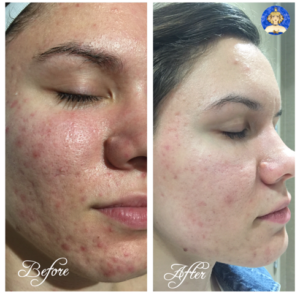Acne is a chronic, inflammatory skin condition that causes spots and pimples, especially on the face, shoulders, back, neck, chest, and upper arms.
Whiteheads blackheads, pimples, cysts and nodules are all types of acne.
It commonly occurs during puberty, when the sebaceous glands activate, but it can occur at any age. It is not dangerous, but it can leave skin scars.
The glands produce oil and are stimulated by male hormones produced by the adrenal glands in both males and females.
At least 80 percent of people experience acne between the ages of 12 and 24 years.
Frequently Asked Questions
Acne caused by a build up of dirt, oil, bacteria and other substances such as dead skin cells. Acne occurs when the pores on your skin become blocked with oil, dead skin, or bacteria.
Each pore on your skin is the opening to a follicle. The follicle is made up of a hair and a sebaceous (oil) gland. The oil gland releases sebum (oil), which travels up the hair, out of the pore, and onto your skin. The sebum keeps your skin lubricated and soft. Acne can be caused by one or more problems in this lubrication process. It can occur when:
- too much oil is produced by your follicles
- dead skin cells accumulate in your pores
- bacteria builds up in your pores
- People who have food sensitivities may even suffer from acne as a reaction to certain food
- Some acne is also caused by hormonal changes such as puberty, pregnancy, menopause and hormonal birth control
All of these problems contribute to the development of pimples. A zit appears when bacteria grows in a clogged pore and the oil is unable to escape.
Some people are more susceptible to acne than others. Those who have naturally oily skin, larger pores, or have greater exposure to acne causing bacteria, are more likely to suffer from acne.
Although acne isn’t a life-threatening condition, it can be painful, particularly when it’s severe. It can also cause emotional distress. Acne that appears on your face can impact your self-esteem and, over time, may cause permanent physical scarring.
Myths about what contributes to acne are quite common. Many people believe that foods such as chocolate or French fries will contribute to acne. While there’s no scientific support for these claims, there are certain risk factors for developing acne. These include:
- hormonal changes caused by puberty or pregnancy
- certain medications, such as certain birth control pills or corticosteroids
- a diet high in refined sugars or carbohydrates, such as bread and chips
- having parents who had acne
- Risk factors include genetics, the menstrual cycle, anxiety and stress, hot and humid climates, using oil-based makeup, and squeezing pimples.
Despite what one might read in popular style and fashion magazines, there is no magic product or regimen that is right for every person and situation.
In general, there are many steps you should do to eliminate acne and improve your skin health.
-
Cleansing and reducing oil:
Washing once or twice a day with a cleansing will keep the skin clean and draw out facial oil.
-
Exfoliating:
A variety of exfoliants can be used. These products may contain salicylic acid in a concentration that makes it a very mild peeling agent. These products remove the outer layer of the skin and thus open pores. Products containing glycolic or alpha hydroxy acids are also gentle skin exfoliants. Using Retinol also another way to exfoliate and can help promote skin peeling. All these options can help a lot to get rid of all the dirt and dead skin and then open all the pores, the factors that caused acne.
-
Reducing bacteria:
Use antibacterial cleansers. The most popular ingredient in over-the-counter antibacterial cleansers is benzoyl peroxide. Using topical antibacterial gels, creams, lotions and antibacterial pads are also helpful. The active ingredients that kill surface bacteria include benzoyl peroxide, sulfur, and resorcinol.
It is important to refrain from trying to scratch, squeeze, or ‘pop’ your acne – this might worsen the infection and produce scarring. It is also important to remember that acne often isn’t one’s ‘fault,’ as it’s usually a genetic condition. You deserve professional treatment to regain your confidence and be your best self.
There are many effective treatments for acne that improve the skin and even remove the acne scars. Each person is an individual case for whom one of these treatments would be the best suitable . cases have to be evaluated on individual basis in order to decide the treatment according to acne type and severity. These treatments are:
- Microdermabrasion
- LED light
- Micro-needling
- Chemical peel
- All these treatments combined with home care products

